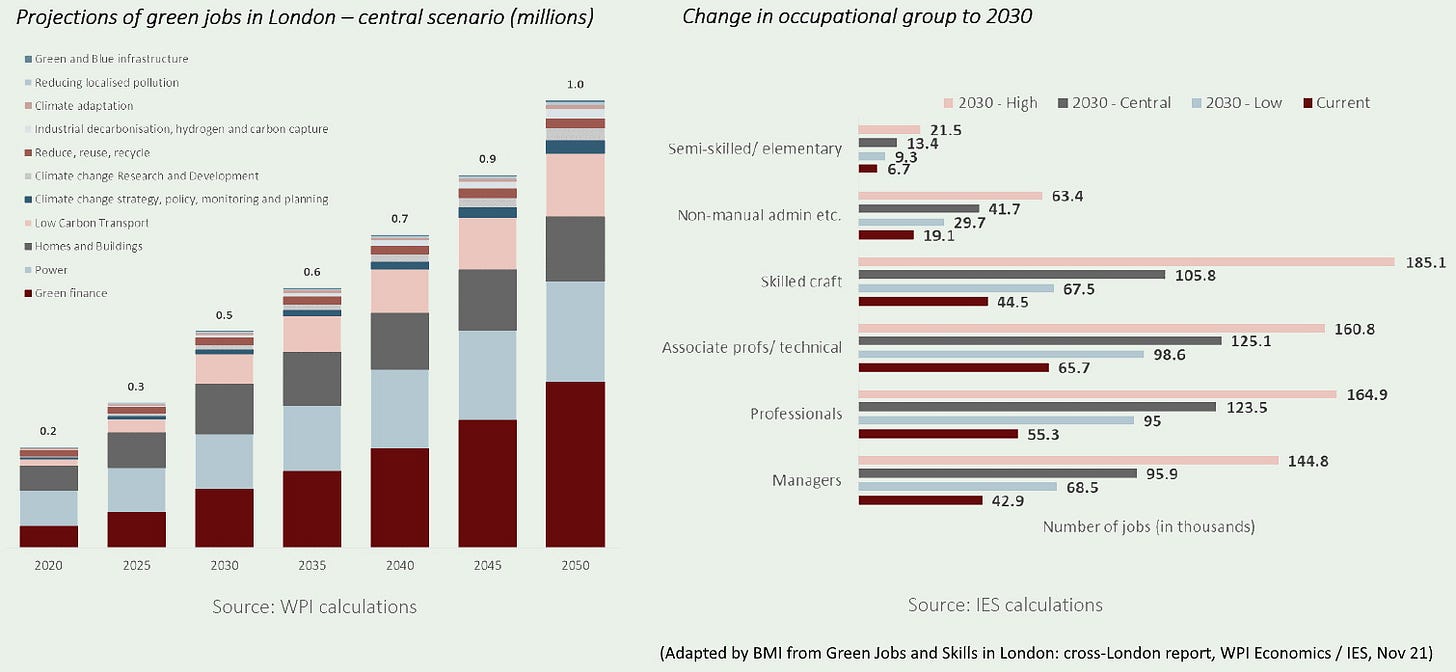If They Build It, Net Zero Will Come
Things like energy generation and EV manufacturing will largely look after themselves if we get the incentives right, according to Tony Wilson, Institute Director, IES.
When we ran our Green Skills survey in September 2021, we asked for opinions on where the gaps were in current green skills education and development. We got a wide range of responses, including several interesting points made by Tony Wilson, Director of the Institute for Employment Studies (IES). We were therefore keen to catch up with Tony to find out a little more about his thinking in this area.
IES is an independent research centre, carrying out research, analysis and consulting in labour markets and employment, including labour market policy, business and HR practices, skills, vocational training, and career services. The institute works for a mix of different funders and clients: including local and national governments, employer bodies, trusts, and foundations. Tony describes some of the work IES has done around green skills in the UK, including work for a report recently published on Green Jobs and Skills in London, and a study for the North East Local Enterprise Partnership (LEP) looking at potential opportunities and risks around the transition to net zero, specifically around energy generation. He says of the North East LEP study: “The evidence was pretty clear around the quite significant demands we're going to have, particularly around things like retrofitting energy, insulation, electrification, and the charging infrastructure around that, with relatively small numbers of people in really high value jobs in things like energy generation, giga factories and so on”.
We start by talking in general terms about Tony’s and IES’s view of the current labour market. Tony believes the challenges today are different to the ones we were facing a year ago. While we were anticipating a prolonged period of pandemic-driven high unemployment, IES estimates there are a million people fewer in the labour market than there would have been on pre-pandemic trends. Just over half of that missing million are aged over 50, with many older people having withdrawn from the labour market for various reasons. Tony comments: “...what's driven labour market growth over the last two decades has been more older people in work, fundamentally, and actually we've halted that, and it's now gone into reverse.”
We move on to talk about the future green labour market, starting with the recent report on Green Jobs and Skills in London. This report, written jointly with WPI Economics for the London local authorities, models several future green labour market scenarios. A central scenario for 2030 projects around half a million green jobs in London, up from 0.2 million in 2020, with huge increases in associate professional / technical occupations (from 65.7k in 2020 to 125.1k in 2030), skilled crafts (44.5k to 105.8k) and professionals (55.3k to 123.5k). So where are these people going to come from?
Says Tony: “I think London is interesting because green finance is a really large driver of it, and if we're including the fact that our energy generation is going to have to move to pretty much 100% renewable then almost every job in energy becomes, by definition, a green job. Then we have the ones that become really important, and they're the national challenges around home insulation, retrofitting and also charging infrastructure, electrification, et cetera. Those are big transitional problems, which will create a lot of jobs.”
“But my point is, how big are these effects? Even that half a million [green jobs in London by 2030] is a little less than 10% of all jobs in London. A proportion of that - about a quarter - are green finance jobs which are just going to happen. There isn't a market failure in the UK's adaptation to green finance opportunities. Financial services are dealing with that just fine.
But while green finance might account for professional occupations, what about associate professionals – which include technicians – and skilled crafts? Tony again: “The problem we've got at the moment is that we are very focused on the product rather than the person – we've really focused on apprenticeships, primarily. It's a classic sort of Model T Ford problem. You can have any training you like as long as it's an apprenticeship, if you want government funding. And then alongside that we have much smaller but valuable initiatives like sector-based work academies. And this new initiative called bootcamps. Bootcamps are predominantly retraining people in existing jobs rather than training people for new jobs. We've got these smaller scale initiatives and we've got this behemoth, which is the apprenticeship programme, where there isn’t an enormous amount of flexibility. So you can't or won't offer an apprenticeship or, if you are an individual, don't want to or can't take up an apprenticeship, billions of pounds of funding there is potentially lost”.
Tony had already told us in our Green Skills survey that he thought bootcamps could be a good model to build on for green skills education, so we ask him more about those. He says it’s very early days, but “…they have a lot of potential in principle - if you get past the kind of name which I don't think is particularly appealing, or won't be appealing to many people. We've got a bit of a gap around that kind of three- to six-months-type government funded or co-funded training that could either support unemployed people to take some time away from job search to get specific skills that will then help them get a job, or to support kind of shorter, sharper training in work for specific potential future opportunities, vacancies and so on. We've avoided that in the UK because we've been concerned that it could lock people into training that may not actually be that beneficial for them. The evidence is a bit mixed. [But] I'm really pleased that the government has recognised we actually do have a market failure”.
While only a small handful of ‘pure’ green skills bootcamps are listed on the government website, Green Edge is watching their development with interest. Tony comments: “…a lot of that will be picked up through things like construction and manufacturing in particular”. We tend to agree.
Another gap identified by Tony in our survey was the degree of support to mainstream adaptation and mitigation in firms outside the core green industries. Social landlords, health services, public services and so on could be supported through training credits, for example, but Tony thinks they would need to link to developing skills within firms to mainstream this, rather than just relying on consultancies. So, are firms getting into mainstreaming green skills training?
“I think firms are, and I think social housing is a really good example. Tonnes of social landlords - and landlords generally - are taking this really seriously and investing in it.
“The task content of a wide range of jobs is going to change and some of the bigger impacts for society and the economy will be beyond just individual green jobs. I think inevitably, because we have quite a fragmented approach to business support generally, we tend to rely quite a lot on employers finding their own way, navigating systems and making optimal decisions for their businesses. That works in many cases, but it doesn't in others. There are lots of things firms can do, but in the day-to-day rush of trying to keep the wheels on the road, they often don't.
“So again, these are things where there can be a case for government intervention, or if not government intervention then at least some funding of, and better coordination of support for, firms to be better employers.
“Bringing that back to green skills, if we want firms that aren't necessarily doing loft lagging, retrofitting, electrification, etc. to making better decisions about the services that they use, about how they source and conserve energy, about the materials they use etc., then we need to be able to not just point them to websites, we need to try to better facilitate some of those discussions around better practice. Very large firms do some of that in house, they have sustainability officers and invest in people who can try to drive improvements or change across businesses. But smaller firms struggle and rely on contracted services”.
But, overall, Tony tends to take the view that the ‘big green things’ like energy generation, EV manufacturing, gigafactories etc. will largely look after themselves if government gets the incentives right. In his view, they aren’t right yet, but in sectors like wind power - and offshore wind power in particular where the UK has a massive potential competitive advantage - the main constraints aren't going to be labour supply. He concludes: “I think ultimately, if we can get the investment right in broad terms, we will find the low thousands of people that we will need to do the kind of high value high skilled work to build that stuff, install it and maintain it. Yes, we've relied a lot on international labour to do that in the past, but we will be able to do that in future actually, because we have an incredibly liberal post-Brexit migration regime for people in well paid [high skilled] work. So I don't feel like ultimately we're going to have a skills bottleneck there”.
Thank you for subscribing to The Green Edge. If you would like to talk to us about your work, research, knowledge or experience in skills for the green economy, please drop us a line at greenedge@bluemirrorinsights.com.
Also, if you feel you’d like to sponsor us and become part of the Green Edge Advisory Group, please contact us at the same address.





